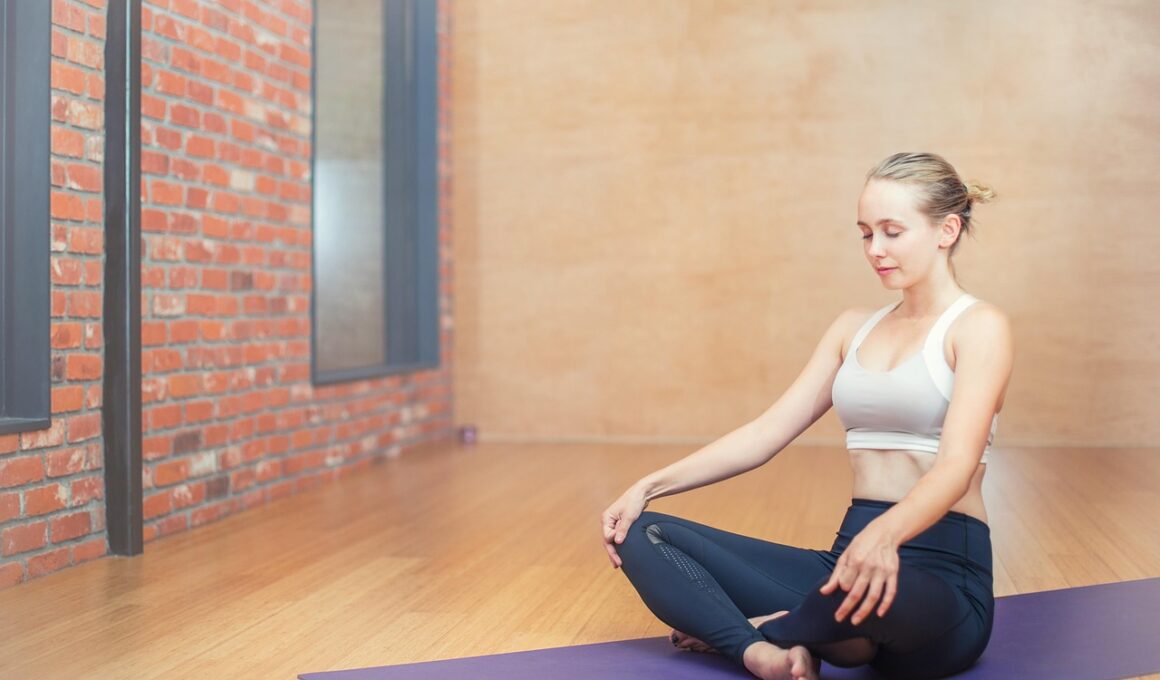Yoga and Meditation: Complementary Exercises for Depression
Yoga and meditation have been widely recognized as effective complementary therapies for individuals suffering from depression. These practices focus on reducing stress and promoting overall well-being. Numerous studies indicate that incorporating yoga into your routine can significantly improve mental health outcomes. This is particularly relevant for those struggling with depression, as the exercises emphasize mindfulness, deep breathing, and relaxation techniques. By engaging in regular yoga sessions, individuals often report a reduction in symptoms associated with anxiety and depression. Furthermore, meditation cultivates a focus on the present moment, allowing practitioners to cultivate a sense of inner peace. The physical benefits of yoga also contribute positively to mental well-being. As the body becomes more flexible and strong, self-esteem often rises. Regular practice encourages individuals to reconnect with their bodies, fostering a healthier self-image. Incorporating these exercises into daily life is a small yet impactful step towards improved mental health. Additionally, both yoga and meditation can be practiced in group settings, further enhancing feelings of community and support. As a result, they become invaluable tools for those seeking relief from depression.
Understanding the Benefits
Understanding the specific benefits of yoga and meditation is vital for those considering these practices. One significant advantage is the impact they have on emotional regulation. Yoga teaches practitioners how to manage their emotions through controlled breathing and physical postures. This empowers individuals battling depression to develop coping mechanisms leading to decreased symptoms. Moreover, research has shown that mindfulness meditation aids in enhancing one’s emotional awareness. Individuals learn to identify their thoughts and feelings without judgment, creating a psychological distance from negative spirals that often accompany depression. Furthermore, yoga increases the body’s levels of serotonin and dopamine, neurotransmitters crucial for mood regulation. Engaging in physical activity also triggers the release of endorphins, natural mood lifters. This biochemical response contributes to feelings of happiness and overall positive mental states. Additionally, practicing these disciplines encourages healthy sleep patterns. Individuals with depression often face sleep disturbances, and improving sleep can have profound effects on mood and energy levels. In essence, yoga and meditation not only foster relaxation but also provide various tools and techniques essential for maintaining mental health long-term.
Finding the right style of yoga is crucial for maximizing benefits. There are many different yoga styles, such as Hatha, Vinyasa, Kundalini, and Yin, each offering unique approaches to practice. Hatha yoga focuses on foundational postures and breathing techniques, making it an excellent choice for beginners seeking to manage depression. Vinyasa, characterized by its dynamic movements, can inspire feelings of vitality while alleviating stress. Kundalini yoga combines physical movement with chanting and meditation, promoting emotional release and increased awareness. For those who may struggle with anxiety, Yin yoga’s slower pace allows for deep stretching along with a meditative component. Yoga is highly adaptable, which means individuals can modify poses to accommodate their comfort levels, enhancing their connection to the practice. Engaging with a knowledgeable instructor can also provide personalized guidance. It’s essential for practitioners to explore various styles and find the best fit for their emotional needs. This can lead to increased enjoyment and commitment, essential elements for experiencing lasting change. Diving deep into the practice can create profound shifts not just physically, but also mentally, enhancing overall psychological resilience.
Meditation Techniques for Depression
Meditation techniques specifically targeting depression can significantly enhance mental health. Among these are guided meditations, loving-kindness practices, and mindfulness meditation. Guided meditations involve following a recording or teacher’s voice, which can be helpful for beginners. These meditations often focus on relaxation and emotional healing, providing a structured approach to exploring one’s feelings. Loving-kindness meditation, also called “Metta” meditation, encourages practitioners to cultivate compassion for themselves and others. This technique can counteract negative self-talk, a common issue for those dealing with depression. By sending love and goodwill to oneself and others, the practice promotes emotional recovery. Mindfulness meditation focuses on being present and connecting with one’s thoughts and feelings without judgment. Regular practice allows individuals to cultivate self-awareness, noting negative patterns before they spiral into deeper distress. It encourages acceptance, fostering a gentle attitude towards oneself amid emotional challenges. As meditation becomes more integrated into daily life, individuals often experience increased awareness of their emotions leading to healthier reactions. Experimenting with different techniques can help practitioners find the most effective avenues for healing and sustained emotional balance.
Incorporating yoga and meditation into daily routines is essential for those facing depression. Setting aside even a few minutes each day for practice can yield remarkable results. Starting with ten minutes of yoga stretches in the morning can wake up the body and promote a sense of calm before the day’s challenges. Likewise, ending the day with a short meditation can aid in sinking into restful sleep. Creating a dedicated space at home that promotes tranquility and focus can enhance commitment to the practice. This area can be adorned with calming elements, such as plants, soft lighting, and cushions conducive to relaxation. Additionally, individuals can benefit from tracking their progress and feelings. Keeping a journal of experiences can help clarify changes in mood and energy levels over time. This feedback can motivate consistent practice and even highlight positive trends stemming from yoga and meditation. Moreover, connecting with others who share similar interests can enhance motivation and accountability. Joining a class or online community dedicated to yoga and meditation creates an environment supportive of emotional well-being. Transforming these practices into daily rituals contributes significantly towards achieving mental balance.
Additional Support and Resources
While yoga and meditation offer substantial benefits for those wrestling with depression, seeking additional support can further enhance recovery. Professional counseling and therapy play crucial roles in understanding personal struggles. Licensed mental health professionals can provide tailored strategies and resources to address specific needs. It’s important to remember that seeking help is a sign of strength, and many individuals experience benefits from combining different approaches. Alongside traditional therapy, community support networks can greatly contribute to mental health. These connections provide reinforced feelings of validation and understanding among individuals navigating similar challenges. Various online platforms offer groups and support communities for those interested in yoga and meditation as tools for coping with depression. Resources like meditation apps can guide users through practices, while local studios may host workshops focused on mental health benefits. As individuals embark on their journey towards healing, aligning with supportive resources fosters resilience and inspirational growth. Additionally, educating oneself about depression and related topics can empower individuals, equipping them with knowledge crucial for effective management. The combination of these resources enriches the process of finding lasting emotional balance.
Ultimately, embracing yoga and meditation as complementary exercises for depression fosters hope and healing. Practitioners may discover the innate power of these practices to transform not only their mental health but their entire lives. The journey toward recovery is unique for everyone, and incorporating various resources will ensure understanding and tailored support. Regular practice can unveil deeper connections to self, providing insight into one’s feelings and emotions. Both yoga and meditation cultivate a sense of calm, allowing individuals to step back from the whirlwind of negativity often accompanying depression. This rejuvenation enables individuals to reconnect with their passions, desires, and dreams left behind. The commitment to developing a personal practice can usher in profound changes over time, contributing significantly to emotional stability. As awareness grows around mental health, promoting these practices as fundamental tools highlights their efficacy in enhancing well-being. Toward that end, creating supportive networks and sharing personal experiences can inspire even greater communal healing. Integrating yoga and meditation into daily life serves not just as an exercise in physical well-being, but also as a vital step towards achieving mental pinnacle care.
In summary, the complementary benefits of yoga and meditation cannot be overstated. Practitioners often find that these disciplines empower them to regain control over their mental health and well-being. By reducing anxiety and promoting mindfulness, individuals can effectively counteract the often overwhelming symptoms of depression. Establishing a consistent routine with yoga and meditation allows for incremental progress and transformation. The beauty of these practices lies in their accessibility and adaptability, making them suitable for many individuals. Wherever you are on your journey, it’s important to approach these exercises with an open mind and heart, celebrating the small victories along the way. Engaging in a community focusing on mental wellness can help reinforce motivation and accountability. As more people learn about the benefits of yoga and meditation for depression, the dialogue surrounding mental health becomes increasingly prominent. This openness can reduce stigma while encouraging individuals to seek help and support. Remember, healing takes time, and incorporating practices like yoga and meditation is a valuable step toward enhanced mental health. By continually striving for balance and self-care, individuals can navigate their unique paths toward improved emotional well-being.


